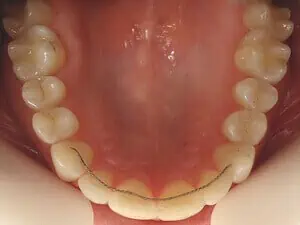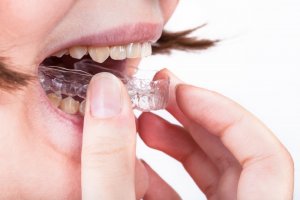Your dental braces are off, your teeth are straight, and now your orthodontist is recommending a bonded fixed retainer.
It can feel a bit like you were tricked; all the metal in your mouth was supposed to be the solution! But does ‘permanent’ really mean for the rest of your life? Will the pain and expense of orthodontia plague your mouth until the end of your days?

Permanent retainers can last up to 10 years but may degrade faster or slower depending on the level of care. Does that mean that this option is better than any other type of retainer?
In this article, we’ll answer your questions about fixed retainers, and cover all sorts of information like:
- What a fixed retainer costs in the UK
- Benefits and potential problems with bonded retainers
- What to do if they break
We hope this helps you decide if this is the best option for you!
What is a permanent retainer?
A permanent retainer (commonly referred to as a ‘fixed’, ‘bonded’, ‘lingual’ or ‘fixed bonded’ retainer) is a metal bar or wire placed behind your teeth to keep them in place after orthodontic work.
They are permanent because they are bonded to your teeth with dental cement. They normally fix to just the front four to six teeth, which means they are not suitable if your orthodontic work involved moving premolars or molars.

Usually, your orthodontist will recommend these either immediately or six months after the removal of your braces to ensure that your teeth stay correctly aligned. Some people get permanent retainers fixed to both their upper and lower teeth. However, dentists are less likely to recommend a bonded wire retainer for top teeth because they have a greater chance of breaking prematurely.
The alternative is a removable retainer which can be taken out for cleaning – and which may only need to be worn at night. There are two types of removable alternatives:
It’s very important to wear a retainer of some kind after having braces, otherwise your teeth will start to shift back out of alignment, known as relapse. Not wearing a retainer long-term after braces could harm your smile and ultimately lead to your orthodontist suggesting braces a second time around.
Watch the video below for a good overview of the different options for keeping your teeth straight after braces.
Are bonded retainers better than removable ones?
Choosing the right retainer can feel like a daunting task in the wake of invasive orthodontic treatment. Will it hurt? Will it cost a fortune? What happens if it breaks? How long will I have to wear it for? Will it affect how I speak?
If you’re having trouble working out which type is best for you, here’s a look at the pros and cons of fixed teeth retainers compared to removable ones.
Pros
The most beneficial thing about a permanent retainer is that it’s impossible to forget to put it in. Once it is in place you can forget that it exists and never have to worry about wearing it according to your orthodontist’s recommended schedule.
This also allows you to avoid all the pain that comes with putting in a retainer that has spent too long out of your mouth and on your shelf. Let’s take a look at some of the other pros:
- Visibility: Since they are glued to the back of your teeth, bonded retainers are invisible to everyone else. In contrast, a wire retainer usually has a visible wire across the front of your teeth, and a clear retainer is much less obvious but still noticeable if you look closely.
- Longevity: A bonded retainer can last for 10 years or more if you care for it properly, which is significantly more than some other types.
- Affordability: Over time, the cost of a permanent retainer vs a removable retainer will likely work out to be less as there is no opportunity for it to be lost and it is much less likely to break.
- Lose-ability: A fixed wire retainer behind teeth is a “set it and forget it” method of orthodontic treatment that is easy to use and nearly impossible to lose.
Cons
While permanent retainers may sound like the best option as far as retainers for teeth go, fixed retainer problems can also occur.
A lingual retainer can make your teeth difficult to clean well, since the wire on the back of your teeth can easily trap bacteria and food. Unless you make the effort to clean around the wire and floss thoroughly, you maybe more susceptible to cavities and gum disease.

An electric toothbrush can help with more efficient brushing, and a water flosser or interdental brush can make it much easier to clean retainers fixed to teeth.
Is a permanent retainer painful? Not necessarily, but it can be uncomfortable or annoying as your tongue is constantly touching it. Most people get used to them pretty quickly though, and soon forget they are there.
A built-in retainer can, like any other dental device, degrade over time. You may have to replace your retainer at some point, which will involve a visit to your orthodontist to remove the remnants of the old one and fix the new one in place.
Other types of retainer can be remade from your original impressions as long as your teeth have not moved, so you don’t necessarily need to spend any time in the dentist’s chair.
So, although they have certain elements of convenience, bonded retainers do require proper cleaning to avoid increased plaque buildup, and they are also more troublesome to replace or fix in the event that the retainer breaks.
Have a look at the following table for a summary of the pros and cons to consider:
Pros | Cons |
Virtually invisible | Makes it more difficult to clean teeth |
Impossible to lose | Could break requiring replacement or repair |
You don't have to remember to put it in | Costs more than removable retainers |
Lasts for many years | Only works on front teeth |
If you prefer a removable Essix retainer, you can simply order your bespoke retainer online with NewSmile.
The process is simple: Just order your impression kit. Make your teeth impressions at home. Send them back to Newsmile so they can craft your retainers, and then receive your retainers in the post at your home and ready to wear.
Click the button below to get started!
How much does a fixed retainer cost in the UK?

included in the price of braces
Fixed retainers cost between £100 and £400 for one arch. If you need a bottom teeth retainer as well as one for your top teeth, this could mean up to £800 in total. However, some dentists include the cost of bonded retainers in your overall treatment package, so you may not need to pay for your first set.
Permanent retainers cost slightly more than removable devices, but they are designed to last for many years and may work out more cost-effective in the long run. A permanent replacement retainer will cost about the same as a new one.
What does permanent retainer removal cost?
What if it breaks and needs to be mended or removed? You can expect to pay £50 to £150 to have your fixed retainer – and all the remaining bonding cement – properly removed. The cost is similar for a repair, which involves re-bonding the wire to the back of your teeth.
How do you remove a permanent retainer?
Attempting to remove a retainer on your own can put your teeth at risk of damage and possibly require your teeth to need further treatment. Our advice is not to try it yourself.
The internet has tons of at-home solutions to offer, including mixing a paste of baking soda and peroxide to soak off the glue affixing the metal wire to your teeth. But the only safe and effective way to remove a bonded retainer is to seek treatment from your dentist.
If the wire has come loose at one end, some orthodontic wax can stop it injuring you while you get to the dentist.
Conclusion: Is a fixed retainer right for me?

Your orthodontist is the only true authority on what type of retainer you should have. The differences between removable retainers and permanent retainers have been outlined in this article to help you make the best choice possible with the guidance of your dental care provider.
Investing in this option is a great way to ensure that the money spent on prior orthodontic treatments will not go to waste if you think you might forget to wear a removable device.
However, there are some disadvantages to fixed retainers. They are more expensive, for a start, although this higher cost should be balanced with their durability. They won’t stop your back teeth from moving, and having that wire fixed to your teeth can cause more oral health problems if you don’t clean it properly.
Ultimately, your dentist will be able to advise you if a permanent retainer is the best treatment option for you.
FAQs
How long do you have to wear a fixed retainer?
Just like regular retainers, you should wear a permanent retainer for the rest of your life unless your dentist or orthodontist gives you different advice. However, it will break eventually. You will need to have it repaired or replaced.
How long do permanent retainers last?
A bonded retainer can last for 10 years or more if you care for it properly, which is significantly more than some other types. If your fixed retainer breaks prematurely, a repair might be possible. This will cost less than a replacement.
How much does a bonded retainer cost in the UK?
The average cost of a bonded retainer in the UK is between £100 and £400 for one arch. This is higher than other types, but a fixed retainer should last for years.
Can teeth move with a fixed retainer?
A bonded retainer is only designed to keep the front four to six teeth in place. It’s possible for any other teeth to move if you don’t have another type of device to keep them in place. Your orthodontist will provide a professional opinion on the best way to maintain the smile you have achieved with braces.
How do you remove permanent retainer glue at home?
If your permanent retainer breaks or falls off, you might be tempted to try to remove the glue by yourself at home. But for your own wellbeing, please go to a dentist to have the glue removed. It’s the only truly safe and effective way to avoid damage to a tooth.
My fixed retainer broke: what should I do?
Make an appointment to visit your dentist ASAP. If the wire is still attached, you can use orthodontic wax or chewing gum to cover the loose end and prevent injury.
NCBI: Fixed Orthodontic Retainers: A Review. Consulted 22nd may 2020.
British Orthodontic Society: Orthodontic Retention for Patients. Consulted 22nd may 2020.




